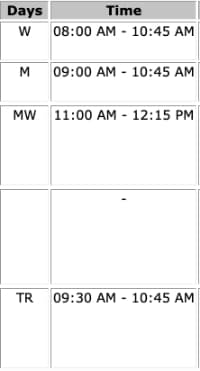How to Plan the Perfect College Class Schedule
Take the stress out of building a college schedule with these tips for planning the perfect college class schedule.
One of the most exciting, but intense times of the semester is when registration opens up for the next college semester.
However, for many college students, scheduling college classes can be difficult.
When it comes to registering for college classes, there is a lot of debate on:
- Which classes to take
- What time to take classes
- And which professors you should take take
There’s also the added frustration and anxiety that comes along with not getting the best registration time ticket or the classes you wanted filling up quicker than you anticipated.
If you’re confused, nervous, or anxious about scheduling your college classes next semester, this blog post is here to provide the best tips for scheduling your college classes.
We’ll discuss:
- 7 things to take into consideration before scheduling your college classes
- 13 tips for scheduling college classes
- And I’ll show you a *REAL* college class schedule example
- Take the stress out of building a college schedule with these tips for planning the perfect college class schedule.
- How should I schedule my college classes?
- What is a normal college schedule?
- 7 things to consider when building your college schedule
- 13 tips for scheduling college classes
- College class schedule example
- Concluding thoughts on planning the perfect college schedule
- Related posts to building a college schedule
- Thanks for reading on how to create the perfect college class schedule.

*This post may contain affiliate links. Purchasing a product or service through an affiliate will earn me a small commission at no additional cost to you. Please read our Disclaimer Policy for more information about the use of affiliate links on this site.
How should I schedule my college classes?
In general, when building a college schedule, you’ll want to schedule your classes in a way that meets your lifestyle, allows you to progress towards graduation, and allows you to commit to your obligations outside of school, like work and extracurriculars, without losing your mind the second week into the new semester. Sounds complicated right? Well… It’s a lot easier than it sounds!
What is a normal college schedule?
A “normal” college schedule is 5 classes per semester or 15 credit hours per semester.
However, depending on your college and degree, you may take more credit hours if you have science labs or longer classes that are more than the typical 3 credit hour class.
For example, in while I was in college I took a Psychology Research Methods course and it was 4 credit hours.
Or, if you take a science class with a lab, you may have a 3 credit hour lecture and then a 1 credit hour lab.
The most important part, especially if you have financial aid, is to create a college schedule that meets the number of credit hours you need to be classified as a full-time college student. For most colleges, that’s 12 credit hours minimum.
However, double-check with your university’s financial aid office for the most accurate information.
7 things to consider when building your college schedule
The best part about college is that you get to make your own schedule (within reason). This allows you to have more flexibility and control over your schedule versus when you were in high school, but there are several things you’ll want to consider beforehand.
1. Work
Having a part-time or a full-time job in college can impact, and in some cases limit, your options when it comes to scheduling college classes.
For example, if you have a full-time job that revolves around a 9-5 schedule, you may find yourself taking more online classes or classes in the evening after work than the typical college student.
Or, if you have a part-time job that has funky hours (like 10-3 one day and then 3-9 the next), you may find it difficult to keep a consistent routine throughout the week.
For instance, you may find yourself taking morning classes on the days you work 3-9 and then taking early evening classes when you work 10-3.
You may also like: How To Study After Working All Day [7 Genius Tips]
Not having a completely open schedule due to work can also limit your options of which professors you can take courses from.
This could potentially result in you taking courses from professors who are not the best fit for you and your learning style.
However, at the end of the day, you need to be able to financially support yourself to get through college, so don’t just quit your job to take a course with a specific professor. It’s just not worth it.
Instead, see if you can ask your boss to adjust your work schedule or reduce your hours at work.
Also look at the reviews on RateMyProfessors.com to help you decide on the best professor who is available when you’re not working for each of your classes.
2. Extracurricular activities
If you are part of a club, Greek life, or play sports (either club or collegiate level), you’ll want to consider how you will fit them into your college schedule.
In some cases, you may need to reduce or step away from certain extracurricular activities if they do not fit in with your college schedule.
However, if you are part of leadership in any of your extracurricular activities, you may need to schedule your college classes around leadership meeting times and regular meetings or practice times.
I would not, though, quit all your extracurricular activities just to focus 100% on college.
You’ll for sure burnout on academics quickly and you absolutely need a break from college and studying.
If you are struggling to balance all your extracurriculars in your college schedule, maybe just pick one or two, and go from there.
3. Mental, emotional, and physical health
College can be very difficult mentally, emotionally, and physically.
From the confidence destroying grades, stressful class projects and papers, to simply feeling exhausted, you need to seriously consider your overall health when planning your college schedule.
Related post: Failing College? 20 Things You Can Do To Overcome It
One way to keep your health in check in college is to not overload yourself with college classes.
4 classes are honestly plenty for most college students, even though taking 5 or 6 would get you closer to graduation. But it just isn’t worth sacrificing your health for a diploma.
Instead, try to find ways to schedule counseling sessions at your university’s counseling center (it’s usually already paid for with your tuition) or time to workout at the gym or take a walk around campus.
4. Pets
If you are a pet owner in college, make sure you consider them when building your college schedule.
You’ll need to make time to feed, play, and give your pet time to exercise (or go on a walk if you have a dog).
Cats, though, are easier as you can leave them with food, water, and litter box and they’ll entertain themselves.
Alternatively, if you have a busy college schedule, consider taking them to a local pet daycare, hiring someone from Wag! or Rover, or having your roommate, family member, or significant other help you care for your pet(s) while you’re in class.
5. Family
Living at home with your parents while attending college can play a role in how you build your college schedule. However, it really depends on your home life.
For example, when I was in college, I lived at home for three years before finally getting an apartment my last two semesters of college.
While I lived at home, I had to find time to sit down for family dinners, do occasional grocery shopping for my parents, and sometimes drive them to appointments.
It wasn’t a huge time commitment, but I always tried to schedule early morning or early afternoon classes, so I could spend time in the evening with my family.
And even if you don’t live at home, still consider your family when creating your college course schedule.
If your family comes into town and visits you, it may not be advantageous to have a 6 PM class when most families would want to go out to dinner.
Or perhaps you want to go home and visit your family on the weekend, so it wouldn’t be a great idea to register for a Saturday class. And yes, Saturday classes exist and they are just as horrible as they sound.
6. How close you are to graduation
In general, the closer your are to graduation, the more limit your choices for classes to register for will be.
This is because upper-level classes are more specialized, and thus taught by professors who are more well-versed in those topics. And those professors only have so much time on their hands between having their own lives and family while also teaching and doing research.
And depending on what major you are in, you may have classes, that are required for graduation, that are only available once a year and are taught by only one professor. This seems to occur more in smaller majors or in STEM majors.
If that is the case, then you need to prioritize those classes above everything else when planning your college schedule, so you can graduate on time.
7. Your personal time management skills
One of the quickest things you learn about yourself in college is whether or not you are good at managing your time.
If you are good at managing your time, then taking 5 classes, holding a part-time job, and being part of a club won’t be a struggle for you.
But if you struggle with even remembering that you have a 5th college class in your schedule or feel overwhelmed by just the thought of taking 5 classes, I would suggest planning a college class schedule with 4 classes only.
Taking even 1 fewer class each semester can make a huge difference in how you manage your time and stress.
In college, I always took 4 classes after my first college semester. My first college semester I took 5 classes, but I felt so overwhelmed and constantly behind on my school work.
The following semester and thereafter, I changed to taking 4 classes each fall and spring semester and 2 classes in the summer to catch-up on my credit hours. And it was only the best decision of my college life!
13 tips for scheduling college classes
1. Take classes at the most optimal times for you
One question every college student asks is: is it better to take classes in the morning or afternoon?
And there is really no good answer. Why? Because it depends on you and your personal lifestyle.
Not every college student is thrilled having to get up at 8 AM to attend their 9 AM class (or even a 10 AM class). These types of students thrive in afternoon classes.
However, some college students don’t mind getting up early, brewing up a pot of coffee, and heading out to their 9 AM class bright eyed and bushy tailed.
If it is possible for you, always try to schedule your classes at times that work best for you, your energy level, and your mood.
There is no point of taking a 9 AM class if you’re going to be moody or half asleep. Similarly, if you are most energetic in the morning, it may be best to take your classes in the morning before the afternoon slump hits.
I personally tried to take as many college classes in the morning as I could when I was an undergrad student. I found myself to be more focused in morning classes and I liked getting my classes over with, so I could do homework in the afternoon and evenings.
2. Consider taking back-to-back to classes
If you’re like me and like getting your classes out of the way as soon as possible, or dislike having long breaks in between classes, scheduling college classes back to-back can be something to consider when planning out your college classes.
However, there are some downsides to taking back-to-back classes:
- You may feel less focused due to not having a long enough break between each class
- You may feel hungry while in class (so eat a big breakfast or bring a snack)
- If you have tests fall on the same day of your back-to-back classes it doesn’t give you time to study before the class starts
- You may feel rushed having only 15-minutes to walk between the two classes if one of them is across campus
- If you forget materials for a class, there’s less time to go back to your dorm or apartment to get the materials or print them out again before your next class starts
If back-to-back classes aren’t your groove, then consider spreading out your college class schedule and allow yourself at least an hour between your college classes. That way you can grab a bite to eat before class, get some studying in, and relax before having to focus for another hour or so in class.
3. Mix and match your college schedule with general education classes and classes for your major or minor
Although general education courses are redundant of high school courses, they do have the perk of being easier compared to your major or minor college classes.
With this being said, if possible, try to save some of your general education courses to take while you are pursuing your upper-level courses for your major or minor.
Having some general education courses to take while taking harder courses can give you a “break” from your more challenging classes.
When I was in college, I always tried to take 1 general education class every semester. However, I eventually ran out of general education classes to take, so I tried to take “easier” classes in my major. So instead of taking all 4000-level major class, I would take at least 3000-level major class to give myself some “breathing room.”
4. Avoid taking too many classes a day
One of the worst mistakes you can make in college is taking too many classes a day. But how many classes is too much in college?
I’d say 3 or more classes a day is too much.
However, there are definitely students who can pull off taking all their classes in one day and thrive. But it really depends on how well you tolerate this kind of schedule and what classes you are taking that semester.
And sometimes your classes will just naturally fall all on the same day, so it can be hard to spread out your classes throughout the week.
For example, one semester I took three classes on Tuesdays and Thursdays, so I was at school from 11 AM to 8 PM. It was a long day for sure, but those were the only days those specific classes were available for my major and minor that semester.
5. Avoid taking classes in the early afternoon
One challenging part about being a college student is that you are not the same person you were in high school.
Specifically, it is more challenging to stay focused and awake in the afternoons. Instead, you’ll be wanting to take a nap.
That’s why I’d recommend NOT scheduling your college classes in the early afternoon (12 – 3 PM) unless you can grab a coffee before class.
I always found myself dozing off in my early afternoon classes and it was so frustrating! However, if you have an interesting enough class, you may be able to stay awake.
6. Avoid taking Friday or Saturday classes
Looking through your class options, it may be tempting to take a Friday or Saturday class, but once the semester really starts, you’ll come to realize how big of a mistake you just made.
Taking Friday classes in college, while not as bad as Saturday classes, can be a struggle to attend after working hard Monday through Thursday. Although, you’ll definitely find that the parking is amazing and there’s less people hogging all the good study spots.
However, not having Friday classes gives you a guaranteed 3-day weekend, which gives you more time for studying, working, and relaxing. And trust me, once you enter the “adult” world, 3-day weekends are far and few between, so take advantage of them while in college.
Much worse than Friday classes are Saturday classes.
Saturday classes exist to help give options to students who work weird job hours or may have children. However, it can be hard to stay motivated in Saturday classes because by Friday you’re already so burned out from everything that happened Monday through Thursday.
Also, taking a Saturday class can make it feel like you never got a full weekend.
For example, I took a Saturday (8 to 10:45 AM) college algebra class my first semester and it was such a struggle every week because that semester I had classes Monday through Saturday. As a result, I felt like I never got a break. So that was the first and last time I ever took a Saturday class in college.
However, if Saturday classes seem appealing to you, then consider not taking classes on Mondays, so you can still get a 2-day weekend.
7. Use Rate My Professors, but take the reviews with a grain of salt
One of the best resources for college students planning out their college schedule for the upcoming semester is RateMyProfessors.com.
Rate My Professors is an entire site dedicated to anonymous student reviews on professors at colleges from around the country. To find reviews on a professor you’re interested in taking a class from, simply enter their first and last name in the search box.
BUT WARNING…
Although the reviews on Rate My Professors can be useful and help you make a more rational choice of who to take for a specific college class, the reviews can be bias.
In other words, usually only students who absolutely LOVE or HATE their professors will write reviews.
The “average” student usually won’t write a review. So take those reviews with a grain of salt.
Also, don’t be discouraged if every professor you look up has a “bad review.” Sometimes that’s just the reality of college and you never know, they could be a wonderful professor and future mentor to you.
8. Take classes with your friends or familiar classmates
If you’re more introverted or shy, taking classes with your friends or previous classmates can be a huge relief, especially if the class is group work based. In college, I always tried to arrange my class schedule, so I could take classes with my twin sister or boyfriend (and sometimes both of them).
9. Try to take classes with professors you have had previously
If you are planning to go to graduate school or want to get a position as an undergraduate teaching or research assistant, then taking classes with the same professor over and over again can be incredibly useful.
By taking a professor repeatedly, they start to recognize your name, work ethic, and your consistent quality of work.
Then, if you ask them in the future to write you a letter of recommendation, be a reference for a job, or ask to assist them in their research or classes, they’ll be able to provide a higher quality, detailed recommendation or reference or be more willing to accept you as a teaching or research assistant than someone who just took one of their classes.
10. Consider taking a Maymester or summer classes to reduce your workload
Taking a full course load, 5 courses a semester, can be really hard.
If you are feeling overwhelmed by the thought of keeping up with 5 different classes, then consider taking some classes either during a Maymester or during a summer semester.
Although course material is delivered quicker during a Maymester or summer semester, sometimes professors reduce the course requirements or materials.
You also have more time to focus on the classes you take during a Maymester or summer semester because you are only taking 1 to 2 classes at a time instead of 4 to 5 classes.
11. Pay attention to your time ticket
Registering for college classes can be an absolute nightmare if you forget what time your registration time ticket opens.
So make sure you write down in your calendar and create a reminder in your phone for the day and time you register for classes. Then once your time ticket opens you can get quickly log in to register and secure spot in all of your dream classes.
And if for some reason you’re in class when your time ticket opens, see if you can get onto your laptop in class to quickly register or give your login credentials to a trustworthy friend who can register you for your classes while you’re in class.
12. Make friends with upperclassmen who can hold classes for you
Unfortunately, if you are a college freshmen or sophomore, it is can be hard to get every single class you want.
This is especially true if it’s a class that a lot of upperclassmen register for or a popular professor.
If you’re worried about your classes being snatched up before you can register, see if you can find an upperclassman who can register for the class under their student account and essentially “hold” the class for you.
Then when its your turn to register, your friend can quickly drop the class and you can snatch it right up before anyone else can.
13. Talk to an academic advisor ahead of time to make sure you’re on track to graduate
Finally, before you go planning out your entire college schedule, make sure you get some “professional” advice from either your academic advisor or a college professor in your major.
Not only can consulting your academic advisor or a professor help ensure you’re on track for graduation, they can also provide alternatives to taking another college course such as study abroad opportunities, directed study (research with a professor), or opportunities to do an internship in exchange for course credit.
College class schedule example
This is an actual screenshot of my college class schedule in Spring 2017.
This semester, I took 2 psychology courses (one of them had a lab, so that’s why it looks like I had 5 classes), 1 online general education course, and 1 statistics course.

Concluding thoughts on planning the perfect college schedule
In today’s blog post, we talked all about how to create the perfect college schedule.
By creating a college schedule that fits your life, you can start each semester more confident in your abilities to juggle it all as a college student as well as ensure you have the best of the best times and professors.
Related posts to building a college schedule
- 30 Things To Do In Between Classes In College
- Everything You Need To Know About Summer College Courses
- College 101: Zoom Classroom Etiquette For College Students
- How To Stay Motivated In College: 15 Student Motivation Tips
- The Ultimate Survival Guide To Online College Classes
Save this blog post to read or refer back to later by clicking the Pinterest share button below this image.








